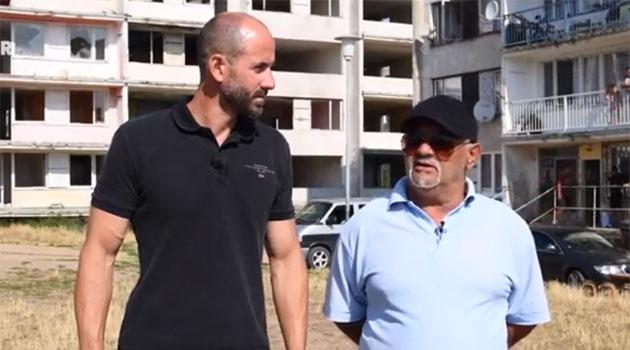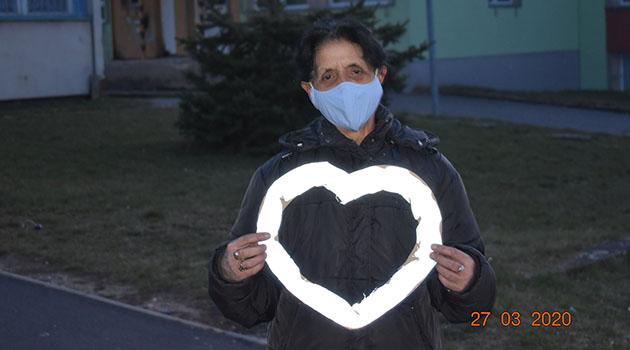Czech mayor gets Romani resident to endorse segregated "container housing", others still oppose it, including Architects without Borders

The City of Most has held its first discussion of a controversial new modular housing project for the Chanov housing estate on the city outskirts that is inhabited mostly by members of the Romani community. The original plan for the announcement of the project was to discuss the issue with the public in attendance, but because of the ongoing pandemic and the need to remain socially distanced, just a few city assembly members and two Chanov residents met at city hall to discuss the project instead.
Local resident Petr Bažo spoke with the Czech News Agency (ČTK) after the meeting and expressed support for the construction of the container units. Another local resident who is a critic of the installation, Jan Chromý, was not invited to attend the meeting.
The building will begin this year. “I believe this is above-standard. I was in favor of it before as well, but today, for the first time, I saw what it would look like,” said Bažo, who has lived at Chanov for 35 years.
“If I had the opportunity, I would certainly go live there,” Bažo told ČTK. He is, however, on record as having said in November 2019 that he was against building the units, taking a clear stand against them and asserting that nobody from the Romani community would be moving into the sheet metal containers used for the modular housing.
“They [local Romani residents] won’t be living there like pigs,” Bažo told news server iDNES.cz in November 2019. One year later, however, in September 2020, he appeared in a campaign advertisement for the group “A Better North” (Lepší sever) together with Mayor Jan Paparega (ProMOST – For Most) and expressed support for building the container units at Chanov.
Bažo is said to have also promised the mayor that he would convince other Chanov residents to accept the new units. One of those residents, Jan Chromý, has long objected publicly to the idea and warned that city hall has only been negotiating with the Chanov residents from whom they expect support for the project.
Chromý believes local residents will not be interested in moving into the new housing. “Nobody wants to go there,” he said ahead of the city council meeting to which he was not invited.
Repair existing buildings or install container units?
Paparega has informed the media that the project is ready to launch. “This is a plan to construct a modular building with a total of 18 units,” he told ČTK and the public broadcaster Czech Radio after the city council meeting.
Nine of the units will have three rooms with a kitchen nook and just over 60 square meters of floor space, while the rest will have two rooms and a kitchen nook and 44 square meters of floor space. Construction costs, including the foundations, utility hookups and equipment, are estimated at around CZK 25 million [EUR 955 000]
The city will be investing its own resources into the project. Local opposition politician Jan Hrubeš (Pirates and Greens for Most), speaking on behalf of those opposed to the project, told the media that, “We still believe that with the aid of subsidies it would be possible to reconstruct the existing apartment blocks and that the city could save a great deal of its own money that now will be spent on the container housing at a cost of roughly CZK 1.5 million [EUR 57 000] per family.”
Local assembly member Adam Komenda (unaffiliated) is of a similar opinion and believes the best thing to do would be to repair the existing buildings that have been damaged and to involve local residents in the work, as has happened before. The mayor, however, believes reconstructing the existing buildings with the aid of local residents would be uneconomical and unrealistic.
“The locals are not qualified and do not want to work, as a rule,” the mayor alleged to the media. “It has been confirmed that it is not possible to draw money for this from a state program because it is segregation, it expands a socially excluded locality,” he said, adding that the debate at Wednesday’s meeting had been more about technical matters, not social ones.
“The critics should be aware that this real estate is owned by the city, and if any sudden incidents were to happen there, it is the city that will be responsible,” the mayor said. In his view, the modular housing units suit the locality.
“I do not believe this expands a socially excluded locality – in short, we want to replace the housing capacity that we would not be able to take advantage of with this capacity that corresponds to modern hygiene standards and trends,” the mayor said. According to local resident Chromý, however, the Romani community of Chanov is not interested in the “container housing” and for that reason there is concern that the future buildings will eventually end up being used as compensatory accommodation for families now living in Most proper whom the city has long wanted to relocate.
Chromý predicts that Romani residents of Budovatelská Avenue and Doubnerova Street in Most will be moved into the new units. The city had originally planned to present its plans for the new housing at the Chanov housing estate, but did not do so because of the ongoing pandemic, although the mayor says there are still plans to do so.
Assembly member Patricia Prokešová (ANO), who teaches at Chanov’s primary school, called the debate during the recent meeting beneficial. “I am not absolutely devoted to the container housing, but I don’t agree with reconstructing the apartment buildings either. The advantage of the modular housing is that they claim it is indestructible,” she said.
“They [housing estate residents] are afraid of who will take up residence in those units, they do not want Romani people from Slovakia, or from Janov [a housing estate in Litvínov] or from other excluded localities in Most. The city promised the social services department will be choosing the tenants,” Prokešová said.
Architects without Borders criticizes the plan
The building of the modular housing is also being criticized by the Architects without Borders (Architekti bez hranic) association, which has assessed the documentation for its construction and zoning proceedings. In their view, a building made of such containers is not appropriate for long-term housing or for use on the city periphery, which is problematic.
Concerns about the plan were previously expressed by Czech Public Defender of Rights Anna Šabatová towards the end of her time in office. She warned that by undertaking the modular construction at Chanov, a locality that is segregated, the City of Most would be committing discrimination on an ethnic basis.
City leadership did not agree with that standpoint and said that they believe housing with a facade of sheet metal is dignified. Officials have not responded to the concerns of local residents that mold will grow in the units, as has happened in the Poschlé neighborhood on the outskirts of Vsetín, where the mayor allowed the building of two such “container houses” for Romani residents whom he evicted from housing in Vsetín proper in 2006.
Currently there are eight prefabricated apartment blocks left at the Chanov housing estate. Nine years ago reconstruction was undertaken of blocks 2, 8, 11 and 13, and local residents contributed to the work.
It cost CZK 43 million [EUR 1.6 million] to repair those four apartment blocks and most of the cost was covered by EU subsidies. Over the course of eight years the city demolished another four prefabricated apartment buildings there that were in poor condition.
